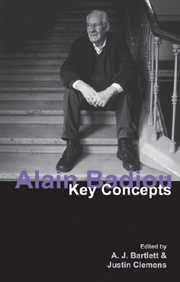Book contents
- Frontmatter
- Contents
- Contributors
- Acknowledgements
- Abbreviations
- Miscellaneous Frontmatter
- Introduction: Badiou's form
- 1 Biography and early works
- PART I THE FOUNDATIONS OF BADIOU'S THOUGHT
- PART II BADIOU'S KEY CONCEPTS OR “CONDITIONS”
- 6 Science
- 7 Love
- 8 Art
- 9 Politics
- PART III BADIOU'S ENGAGEMENT WITH KEY PHILOSOPHERS
- Afterword: Badiou's futures
- Bibliography
- Index
6 - Science
from PART II - BADIOU'S KEY CONCEPTS OR “CONDITIONS”
- Frontmatter
- Contents
- Contributors
- Acknowledgements
- Abbreviations
- Miscellaneous Frontmatter
- Introduction: Badiou's form
- 1 Biography and early works
- PART I THE FOUNDATIONS OF BADIOU'S THOUGHT
- PART II BADIOU'S KEY CONCEPTS OR “CONDITIONS”
- 6 Science
- 7 Love
- 8 Art
- 9 Politics
- PART III BADIOU'S ENGAGEMENT WITH KEY PHILOSOPHERS
- Afterword: Badiou's futures
- Bibliography
- Index
Summary
Rationalism and scientism
Badiou is a rationalist: he holds that mathematics captures whatever is sayable about being qua being and names science (alongside art, politics and love) as one of the generators of the truths that condition philosophy. It would be difficult to overstate the extent to which this sets him apart from the main stream of post-Hegelian continental philosophy. From Kierkegaard and Nietzsche, through Heidegger and Adorno, up to Foucault and Derrida, continental philosophers have sought to radicalize Kant's critique of reason by exposing the limitations of conceptual rationality in general and of scientific reason in particular. For continental philosophers, scientific reason is congenitally deficient, whether because of its disregard for the concretely existing individual (Kierkegaard); its “religious” reverence for objective truth (Nietzsche); its persistent reduction of time to space (Bergson); its subordination to the prejudices of the natural attitude (Husserl); its inability to understand entities in any terms other than that of present-at-hand actuality (Heidegger); its blind submission to the utilitarian imperatives of instrumental rationality (Adorno and Horkheimer); or its unwitting compliance with power–knowledge complexes (Foucault). This list is by no means exhaustive; it could be expanded to include similar assertions about the debilities of science made by other influential continental philosophers such as Marcuse, Merleau-Ponty and, more recently, Michel Henry.
If pressed about their overwhelmingly negative characterizations of science, continental philosophers are liable to protest that they are criticizing “scientism” rather than science itself (for which, they assure us, they harbour nothing but respect).
- Type
- Chapter
- Information
- Alain BadiouKey Concepts, pp. 61 - 72Publisher: Acumen PublishingPrint publication year: 2010
- 2
- Cited by

